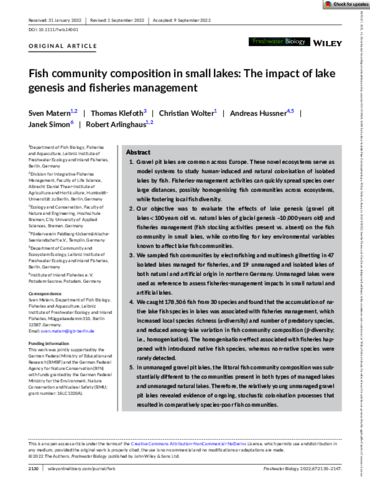1. Gravel pit lakes are common across Europe. These novel ecosystems serve as model systems to study human-induced and natural colonisation of isolated lakes by fish. Fisheries-management activities can quickly spread species over large distances, possibly homogenising fish communities across ecosystems, while fostering local fish diversity.
2. Our objective was to evaluate the effects of lake genesis (gravel pit lakes < 100 years old vs. natural lakes of glacial genesis ~10,000 years old) and fisheries management (fish stocking activities present vs. absent) on the fish community in small lakes, while controlling for key environmental variables known to affect lake fish communities.
3. We sampled fish communities by electrofishing and multimesh gillnetting in 47 isolated lakes managed for fisheries, and 19 unmanaged and isolated lakes of both natural and artificial origin in northern Germany. Unmanaged lakes were used as reference to assess fisheries-management impacts in small natural and artificial lakes.
4. We caught 178,506 fish from 30 species and found that the accumulation of native lake fish species in lakes was associated with fisheries management, which increased local species richness (α-diversity) and number of predatory species, and reduced among-lake variation in fish community composition (β-diversity; i.e., homogenisation). The homogenisation-effect associated with fisheries happened with introduced native fish species, whereas non-native species were rarely detected.
5. In unmanaged gravel pit lakes, the littoral fish community composition was substantially different to the communities present in both types of managed lakes and unmanaged natural lakes. Therefore, the relatively young unmanaged gravel pit lakes revealed evidence of ongoing, stochastic colonisation processes that resulted in comparatively species-poor fish communities.
6. We concluded that fisheries management by anglers speeds up the colonisation of gravel pit lakes with native fish species in the study area. For planning initial fish introductions in newly created gravel pit lakes, it is recommended that fish communities from ecologically similar natural lakes within the same geographical region are used as references to maintain the biotic integrity of newly created fish communities.

